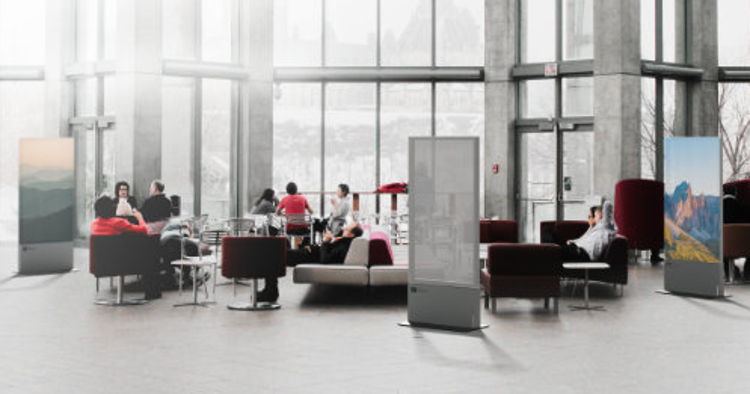Durst, leading manufacturer of advanced digital printing and production technologies, is responding to the COVID pandemic with another initiative.
As early as April, during the lockdown, Durst had started the production of community masks as a first preventive measure, now Durst is stepping up its efforts and presenting an innovative solution for reducing the viral load in indoor environments, the Durst UVC-R Air Disinfection System.
The new normality that shapes our private and professional life is determined by masks, distance rules and disinfectants. This situation will not change in the short or medium term. Even if there will be a vaccine against COVID-19, new types of viruses and mutations will most likely occur. Therefore, over the last few months, Durst has put its expertise in the laboratories, in production, in UV technology, in flow simulations and in the safety guidelines together, to bring a piece of quality of life back to the new normality, with the Durst UVC-R Air Disinfection System.
In the Durst Labs, the main transmission paths and descent rates of droplets and aerosols that transport virus-containing liquid particles were analyzed, as well as the effectiveness of countermeasures with continuous air exchange and UV irradiation. The solution: Durst UVC-R combines both air exchange and UV irradiation in one system, effectively reducing infectious aerosols, viruses and germs in indoor environments. Through an antiviral membrane, the room air is led into a closed system and irradiated with UV-C light.
The disinfected air is continuously released back into the room through an air outlet.
Special features of the Durst UVC-R
• Closed, radiation-protected chambers with high-performance UV-C modules in airflow-optimized and mirrored channels.
• Generation of ozone-free UV-C radiation with a wavelength of 254 nanometers.
• Suction nozzles over the entire surface on both sides of the system at the level of the aerosol origin
• Antiviral coating of the membrane surface.
• Whisper-quiet with a typical noise level of 25 dB (A).
“We checked the efficiency of the UV-C sources in our laboratories and analyzed the ideal exposure time and volumetric flow," said Christoph Gamper, CEO and co-owner of the Durst Group. “An external laboratory for medical technology and disinfectants in Germany is currently in the process of verifying our results. At the same time, the efficiency of the Durst UVC-R is tested in real mode with "pseudoviruses" or so-called bacteriophages.
Efficiency Durst UVC-R
The Durst UVC-R’s center disinfection zone measures 4 x 4 x 2.5 meters. However, Durst points out that no specific statements about square meters or volume size can be given as a general answer in terms of efficiency, as the efficiency depends on many factors such as temperature, air flows in the room, ceiling height, number of people, etc. Therfore Durst gives the following example for the efficiency: 4 people sit at a table and are surrounded by a volume of 8 m³. Each person inhales and exhales about 0.5 m³ of air per hour, a total of 2 m³. Durst UVC-R disinfects 12.5 times this volume or 25 m³ in 15 minutes and 50 times the breathing volume of 4 people or 100 m³ in one hour.
If the UVC-R is placed in a larger room, a constant mixing of the room air around the disinfection center is taking place, which means that by the permanent release of purified air the viral load is reduced even outside the central zone.
"We see in Durst UVC-R not only a preventive measure to reduce the viral loads," Christoph Gamper. “Together with the South Tyrolean industrial designer Christian Zanzotti we have developed portfolio, that can harmoniously be integrated into many interior concepts. Furthermore, the anti-viral coated membrane can be personalized with our digital printing systems."




